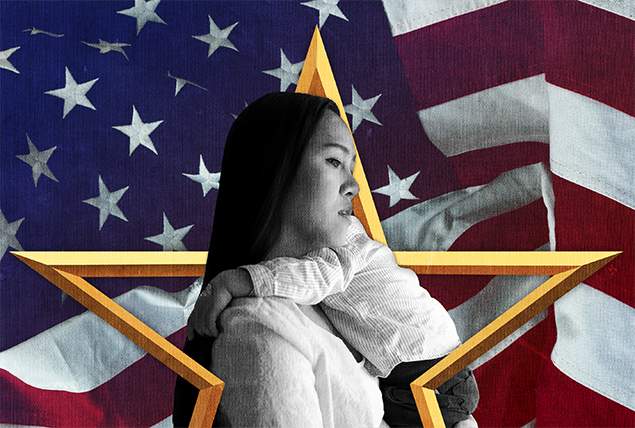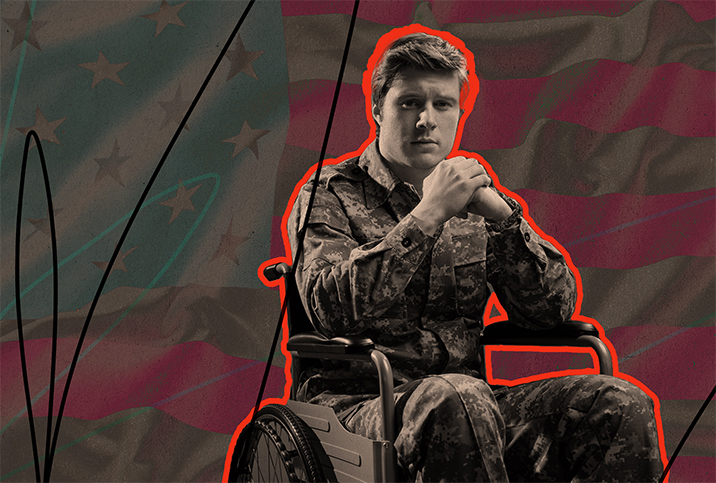Gold Star Families and Survivors Exhibit Unyielding Spirit

Memorial Day holds profound significance for the Gold Star families of United States service members who made the ultimate sacrifice in the line of duty.
For those spouses and their families, the commemorative holiday extends far beyond a three-day weekend or an opportunity to enjoy outdoor barbecues with loved ones. It's a time of remembrance.
What is a Gold Star family?
A tradition dating back to World War I, a Gold Star designation is given to families who lose a loved one in the service. It represents an American experience that embodies sacrifice, resilience and strength.
Losing a spouse in military service leaves an indelible mark on the lives of their partners and the families they leave behind, forever altering their reality. Gold Star wives share how they navigated grief, honored their loved ones and learned to love again in the uncharted aftermath of their partners' tragic deaths.
The bond of love and loss
At the heart of being a Gold Star spouse lies the deep bond of love shared with their fallen service member.
Gold Star wife and United States Air Force veteran Natalee King described the knee-buckling experience of being informed of her husband's death on an episode of the Drive On Podcast.
"They just kept saying, 'Let's sit down, Mrs. King,' she said on the podcast. "I didn't want to sit down, I just wanted to know why they were there in dress blues."
King, who shares a son with her late husband, Senior Airman (SrA) John King II, said she collapsed on the floor when she heard the news: Her partner died in a freak accident at Andrews Air Force Base in Maryland.
"I felt like I was about to throw up. It was one of the worst pains I've ever felt. It literally uprooted my entire future in life," King said. "You’re not just losing that person, but you’re losing all the unwritten chapters that you wished you had written."
The trauma of losing her husband opened the door to a drug addiction that took King five years to kick.
"I tried to commit suicide multiple times," she said. "I don’t know why I’m still here. I didn’t choose these hardships, of course, but you know, I’ve had to go through them anyway. And if I can make it through the other side, it’s possible for someone else."
The Gold Star family support network
In the midst of life-altering events, Gold Star widows find support networks they never knew they would need.
In King's case, her Instagram account became a platform for fostering community.
"I'm trying to build a community because the one thing that I felt after my husband passed was loneliness," she said. "I felt so alone. Like nobody knew how I felt, even if people told me they knew how I felt or they were hurting just as much as me."
Encouraging open communication, the Gold Star wife said she wants others struggling with the loss of a service member, or drug addiction, to know there is hope.
"I don't know it all, but I know enough to let people know that I'm happy today and I'm at peace," she said.
During tough times, King said she reminds herself to persevere.
"You always adapt and overcome," she said. "You have to in life, you just have to."
There are numerous organizations available to help Gold Star spouses and families.
These potential support outlets include:
- The Gold Star Wives of America Inc. is a Congressionally-chartered nonprofit service organization to help widows or widowers whose spouses died during military service.
- The Society of Military Widows can help the widows of career military members return to civilian life.
- Tragedy Assistance Program for Survivors (TAPS), a Washington, D.C.-based organization, offers help including a peer support network, crisis intervention and case worker assistance.
- The Department of Veterans Affairs (VA) offers bereavement counseling for family members of the armed forces, reservists and those who were in the National Guard who died while in the service.
Preserving the memory
Gold Star wife Jennifer Carazo memorialized her late husband's lifelong passion for service by founding a nonprofit organization dedicated to Gold Star families.
On July 22, 2010, Lt. Col. Mario Carazo, 41, died in Afghanistan when his AH-1W Cobra was shot down while assisting Marines engaged in a firefight.
Carazo described the aftermath of her husband's death in a recent episode of the U.S. Department of Defense's podcast, Military OneSource.
"I have two children, so at the time I was very consumed with raising them and sort of moving forward in life and trying to provide for them," Carazo said on the podcast. "But I slowly started getting involved in other organizations and giving back."
In 2016, Carazo founded The Sugar Bear Foundation, a nonprofit organization that provides Gold Star spouses and their children with career, education and wellness programs.
"Sugar Bear was his call sign and it was very fitting," she said. "If you see pictures of him, he was just a very happy and jovial spirit."
The nonprofit gives Carazo the opportunity to continue her husband's legacy of service for years to come.
Gold Star Spouses Day is another way for surviving spouses to share the memories of their lost active-duty soldiers. Originally known as Gold Star Wives Day, it became Gold Star Spouses Day in 2010 and is celebrated on April 5 every year.
This annual recognition is a nod to the original Gold Star tradition that began in 1918 during World War I. People flew flags with a blue star representing each active-duty service member in the family.
If someone were killed in the war, the star color changed from blue to gold. In addition to Gold Star flags, some people choose to wear a Gold Star lapel button the military gives to the military spouse and other surviving family members, including parents, children and stepchildren, according to Military OneSource.
Dating after loss
Friends and family were less than supportive when Gold Star wife Sarah Morgan, of North Carolina, began dating following the death of her late husband.
Morgan was 22 years old when her husband Cpl. Paul J. Miller was killed in action in Afghanistan on July 19, 2010. The couple had been married for a little over two years when Cpl. Miller's life was cut short.
Months after her husband's death, Miller began dating. The Gold Star widow said she lost friends when she did that and later became engaged to her now-husband, according to an article she wrote and published on MilitarySpouse.com.
She said she was "paralyzed" by the way she was treated following her late husband's death, but that it also made her stronger.
"The way I look at it, there are very few things in the world that could happen to me that would hurt more, or be harder than Paul's death," she wrote. "That means I can handle anything that happens to me, because I’ve already survived the worst. That is power."
Moving on is moving forward
Miller offered words of advice for those consoling someone in her situation.
"Everyone grieves differently, and that right there is probably the biggest thing I could teach you," she explained. "Some people need to be alone, some need to be surrounded by love."
Never compare your grief to the grief of another person, she advised, because no two people grieve the same way.
"Just because I moved on, got remarried and had a couple babies doesn’t mean that I don’t think about Paul every single day," she wrote. "Paul is my firstborn’s middle name. Me moving on was more like me moving forward. How can anyone say anything about me continuing to live?"
On Memorial Day 2016, fearing the world was beginning to forget about Miller, Morgan posted to Facebook a photo of her latest project: random acts of kindness cards she made in honor of her late husband. They simply read: “This random act of kindness was done in memory of Cpl. Paul J. Miller, KIA 19 July 2010.”
The social media post about the cards quickly spread.
"After years of feeling like I had no support, suddenly I had support all over the country, and as of today, I’ve passed out over 4,000 of these cards," she wrote. "The willingness the public had to participate showed me that it’s only a small population of people who carry that hatred that I’ve been plagued with for years."
The bottom line
In the face of unimaginable loss, Gold Star spouses rise above the challenges. They embody resilience, honor their loved ones and nurture a sense of hope that inspires others. Memorial Day is just that to them: a time to remember.
Even if they have moved forward, they look back, each in their own way.


















